Liberty Park (Salt Lake City)
Liberty Park is a popular public urban park in Salt Lake City, Utah. It is the city's second-largest public park, at 80 acres (32 ha), being surpassed only by Sugar House Park which has 110.5 acres (44.7 ha).[5] The park features a pond with two islands, and is also the location of Tracy Aviary. The park is listed on the National Register of Historic Places (NRHP) and it includes the Isaac Chase Mill, which is also NRHP-listed.
| Liberty Park | |
|---|---|
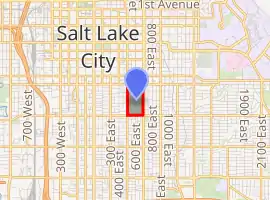
| |
| Type | Urban park |
| Location | Salt Lake City, Utah |
| Created | 1882 |
| Status | Open all year |
Liberty Park | |
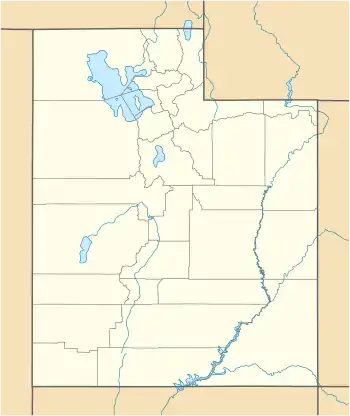  | |
| Coordinates | 40°44′44″N 111°52′26″W |
| Area | 80 acres (32 ha) |
| Architect | Don Carlos Young |
| NRHP reference No. | 80003926[1][2] |
| Added to NRHP | December 11, 1980 |
Isaac Chase Mill | |
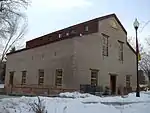 | |
| Location | Liberty Park, 6th East, Salt Lake City, Utah |
| Coordinates | 40°44′36″N 111°52′25″W |
| Built | 1852 |
| Architect | Weeks, William |
| Part of | The Tracy Aviary in Liberty Park (ID80003926) |
| NRHP reference No. | 70000627[3][4] |
| Added to NRHP | June 15, 1970 |
The park is prominently featured in all seasons of the Disney Channel original series Andi Mack, however, it is never mentioned by name.
Facilities
Public facilities include playgrounds, restrooms, bowery, concession stand, children's play areas, picnic areas, large grassy areas, horseshoe pits, a swimming pool, basketball courts, volleyball courts, tennis courts, bocce ball courts, a 1.5-mile woodchip jogging path, a 1.42-mile paved jogging path, seasonal amusement rides and a greenhouse. Other seasonal activities and public facilities include paddle boats, recreational games, and festivals. It is a popular jogging, rollerblading and cycling location.[6][7]
Liberty Park is a popular place to sit and watch Salt Lake City's Pioneer Day fireworks display, which go off in the park across the street, on the 24th of July.
Large crowds gather in the park on Sundays during the spring, summer, and early fall for drum circles that last all day. An assortment of people, pets (primarily dogs), musical instruments and dance styles merge every Sunday at the park.
A sculpture/fountain models the Jordan River and its canyon tributaries. In the summertime children can play in the water fountain.
During the COVID-19 pandemic, most facilities temporarily closed. This included playgrounds, volleyball courts, Chase Home, and Tracy Aviary. However, it was extremely popular for people walking, biking, and spending time outdoors.
NRHP listing
The entire 110 acres (45 ha) of the park was listed on the National Register of Historic Places in 1980 as Liberty Park.[1]
It was established in 1881 upon purchase from the estate of Brigham Young. It is significant as "Utah's best example of the 'central park'", following example of New York City's Central Park in the general reform movement that represented.[2]
Several historic buildings and markers are located throughout the park.
Isaac Chase Mill
The Isaac Chase Mill is located in the northeast corner of Tracy Aviary, off 6th East. Built in 1852, the mill is the oldest commercial building still standing in Utah. It was listed on the U.S. National Register of Historic Places in 1970.[3] The mill was designed by architect William Weeks.[4]
Chase Home
The Chase Home Museum of Utah Folk Arts is located in the historic two-story adobe house of Isaac Chase. Admission to the museum is free.[9] The Chase home is operated by the Utah Division of Arts & Museums.[10] It is the permanent home of the State Folk Arts Collection since 1987 and over 200,000 visitors have experienced its free programs. It has become the place where traditional artists from Utah's ethnic, native, occupational and rural communities share their crafts, music, and dance with their own communities, their fellow Utahns, and with visitors from around the world. In addition to exhibits and concerts, the Chase Home contains a large archive of recordings and photographs that document Utah's traditional culture.
Tracy Aviary

Tracy Aviary is located on 8 acres (3.2 ha) of land in Liberty Park. A Salt Lake City banker Russell Lord Tracy founded Tracy Aviary when he donated his private bird collection to Salt Lake City and its children. Open to the public since 1938, Tracy Aviary maintains a collection of approximately 400 birds representing about 135 species. Several of those bird species participate in their Species Survival Plan. The SSP is a breeding program that promotes genetic diversity in the captive animal populations. The Tracy Aviary is also an AZA accredited facility, and it is one of two free standing aviaries in the nation.[11]
History
In 1860 the land became the property of Brigham Young, who planted varieties of mulberry, cottonwood and other trees. In pioneer days it was known as Mill Farm, Forest Park and Locust Patch. In 1881, Salt Lake City purchased the land from the Young estate. Also in 1881 the city held a public competition for the park's landscape design. Joseph Don Carlos Young, Utah's first academically trained architect and a son of Brigham Young, won the competition which included a $100 premium.[12] On June 17, 1882 the 80 acres rectangular parcel was introduced as a recreational area and officially named Liberty Park.[13]
A city zoo once operated within the park, but was relocated and became the Hogle Zoo in 1931. In 1938 the Tracy Aviary opened.
Many of the park's trees were toppled by the 2020 Utah windstorm.[14]
Red Butte Creek oil spill
In June 2010, an estimated 20,000 gallons of oil spilled into the Red Butte Creek from a Chevron Corporation pipeline. The spill prompted the closure of Liberty Park as oil spread to the nearby Jordan River.[15] 150 to 200 birds, many of them Canada geese, came in contact with the oil and were taken to Hogle Zoo to be cleaned.[16] Officials have advised residents that humans and animals should avoid water access points along Liberty Park, the Jordan River and Red Butte Canyon.[17]
Images
 Chase Home Museum of Utah Folk Arts
Chase Home Museum of Utah Folk Arts Liberty Lake
Liberty Lake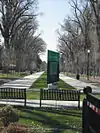 900 South Entrance
900 South Entrance Free Wi-Fi in the park
Free Wi-Fi in the park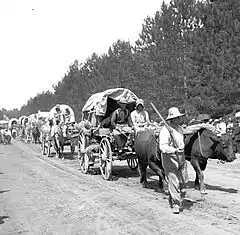 Re-enactment of Mormon pioneers in the 1912 Pioneer Day Parade in Liberty Park
Re-enactment of Mormon pioneers in the 1912 Pioneer Day Parade in Liberty Park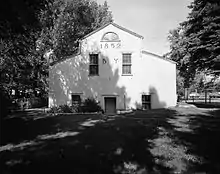 Isaac Chase Mill, August 1968
Isaac Chase Mill, August 1968
References
- "National Register Information System". National Register of Historic Places. National Park Service. July 9, 2010. Liberty Park
- Karl T. Haglund (December 1979). "National Register of Historic Places Inventory/Nomination: Liberty Park". National Park Service. and accompanying five photos from 1980
- "National Register Information System". National Register of Historic Places. National Park Service. July 9, 2010. Isaac Chase Mill
- Melvin T. Smith (May 21, 1970). "National Register of Historic Places Inventory/Nomination: Isaac Chase Mill". National Park Service. and accompanying photos
- Sugarhouse Park Website
- Liberty Park at ProtoPhoto.com
- And the Winner is...Humpday Giveaway Archived 2010-03-22 at Archive.today in Salt Lake Magazine
- Roberts, Allen D. (Summer 1976). "More of Utah's Unknown Pioneer Architects: Their Lives and Works" (PDF). Sunstone. Provo, Utah. 1 (3): 49–50.
- Utah Arts Council-Chase Home Museum of Utah Folk Arts
- Utah Division of Arts and Museums
- "Tracy Aviary - About Us". tracyaviary.org. Retrieved 2019-07-22.
- Deseret Evening News, "The Old Fort Square [also discusses Liberty Park]," 3, March 1891.
- Utah History Resource Center Archived 2008-06-28 at the Wayback Machine
- Klopfenstein, Jacob (September 14, 2020). "About 1,600 still without power following Utah windstorm, Rocky Mountain Power reports". KSL. Retrieved September 25, 2020.
- Alberty, Erin., Winters, Rosemary. Residents to Chevron: Clean up the mess. The Salt Lake Tribune. June 12, 2010.
- O'Donoghue, Amy Joi., Smith, Josh. Oil spill in Red Butte Creek threatens waters, wildlife. Deseret News. June 12, 2010.
- Salt Lake City officials, Chevron crews managing severe oil spill. The Baltimore Sun. June 13, 2010.
External links
| Wikimedia Commons has media related to Liberty Park. |
- Liberty Park official website
- Tracy Aviary official website
- Historic American Buildings Survey (HABS) No. UT-49, "Isaac Chase Mill, Sixth East Street, Salt Lake City, Salt Lake County, UT", 4 photos, 6 measured drawings, 7 data pages